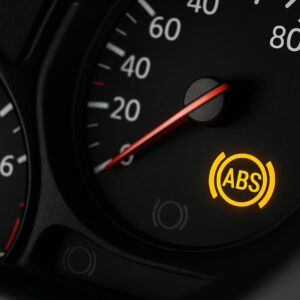Modern vehicles come with many safety features, but few are as essential as the anti-lock braking system (ABS). When the ABS warning light turns on, it’s more than just a minor dashboard alert. A trusted Colorado car crash legal team will tell you that ignoring this light could increase your risk of accidents and mechanical failure.

What Is ABS And Why Does It Matter?
ABS stands for Anti-lock Braking System. It is what prevents your wheels from locking up during sudden stops or on slippery roads. This allows you to maintain control and steer safely in the event of an emergency.
Without ABS, braking in dangerous conditions, such as rain, ice, or snow, becomes much riskier. The system kicks in automatically, giving you better traction and stability. It’s a special technology explicitly designed to prevent accidents, not just reduce them.
Most modern cars include ABS as a standard feature. Knowing how it works and when it fails is vital to your safety.
What Does The ABS Warning Light Mean?
The ABS warning light typically appears as the letters “ABS” inside a circle on your dashboard. When this light remains on after you start the car, it indicates a problem with the anti-lock system. While your regular brakes may still function, the ABS will be disabled until the issue is resolved.
The light may turn on due to sensor issues, low brake fluid, or a damaged ABS module. Even worn brake pads or dirty wheel hubs can trigger it. The light isn’t just a suggestion; it’s telling you that the system is compromised.
Driving with the ABS light on doesn’t always mean immediate danger. But it does mean you’re missing a key part of your car’s safety system.
Common Causes Of ABS Light Activation
Several things can cause the ABS light to turn on. One of the most common reasons is a faulty wheel speed sensor. These sensors inform the system of the speed at which each wheel is moving. When they malfunction, the ABS isn’t able to respond correctly.
Low brake fluid is another frequent culprit. If the brake fluid is below the recommended level, the system may not function properly. This can also affect your main braking system, not just the ABS.
Corroded wiring or damaged control modules can also trigger the light. These electronic parts are very sensitive and can deteriorate over time, especially in areas with harsh weather conditions or road salt.
What Happens If You Ignore The ABS Light?
Ignoring the ABS light could lead to more than just costly repairs; it puts your safety and that of others at risk. Without ABS, your car is more likely to skid or slide during emergency braking. You may also lose steering control in slippery conditions.
In critical situations, ABS helps to shorten your stopping distance. Without it, your ability to react quickly is reduced. This becomes especially dangerous during rain, snow, or on bumpy and uneven roads.
Minor problems can also get worse if left unchecked. What starts as a minor sensor failure can turn into a complete system failure if left unaddressed for too long.
How ABS Problems Relate To Brake System Failures
While the ABS is separate from the basic brake system, they do still work closely together. If something affects the ABS, it can impact your overall brake performance. That’s why any warning light, ABS or otherwise, should never be ignored.
An ABS light could also be a sign of more serious brake system issues. If the light appears alongside a brake warning light, you should stop driving your vehicle and seek service immediately. These indicators are designed to protect you from any potential failure.
The longer you wait, the higher the risk of complete brake failure becomes. It’s always better to act early.
Staying Safe And Proactive
Maintaining your ABS in good working condition is essential for being a responsible driver. When the light comes on, treat it seriously. A quick check by a professional can prevent larger problems, as well as give you peace of mind.
Preventive maintenance, such as checking your tire pressure and fluid levels, can help reduce the likelihood of ABS issues. Addressing problems early not only saves money but also protects your safety. If you’re unsure what the light means, don’t just guess; get it diagnosed. Whether you’re commuting daily or heading into the mountains, your ABS could make all the difference in an emergency stop.
Conclusion
The ABS warning light isn’t just another dashboard alert; it is a crucial signal that your vehicle needs attention. Ignoring it could lead to serious brake system failures and other safety hazards. A skilled Colorado car crash legal team will always encourage drivers to act quickly when safety systems indicate trouble.